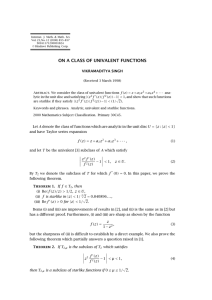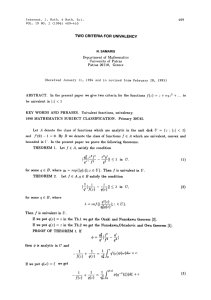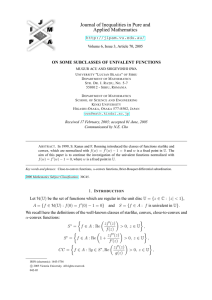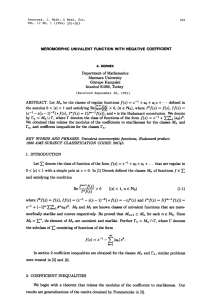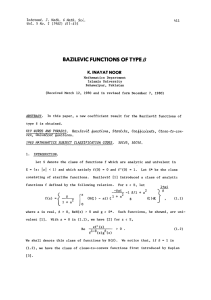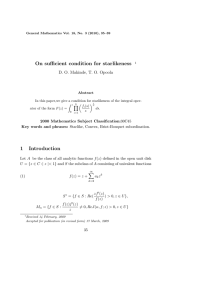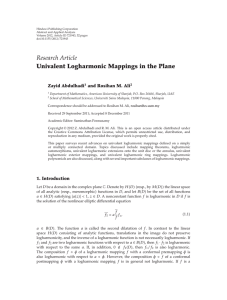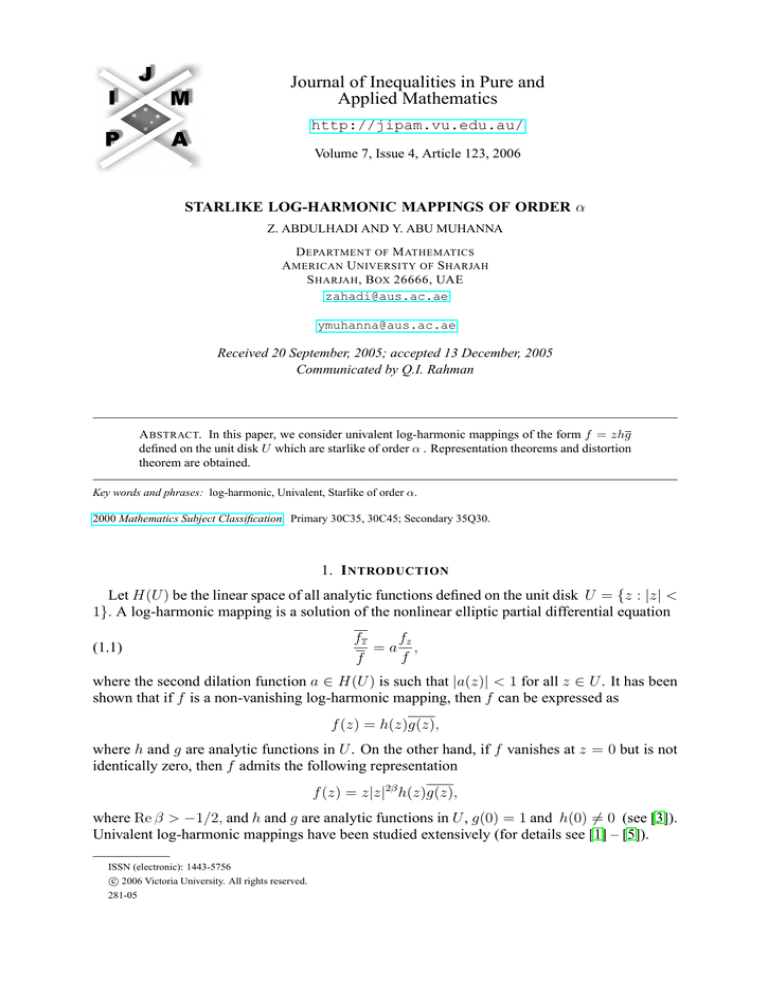
Journal of Inequalities in Pure and
Applied Mathematics
http://jipam.vu.edu.au/
Volume 7, Issue 4, Article 123, 2006
STARLIKE LOG-HARMONIC MAPPINGS OF ORDER α
Z. ABDULHADI AND Y. ABU MUHANNA
D EPARTMENT OF M ATHEMATICS
A MERICAN U NIVERSITY OF S HARJAH
S HARJAH , B OX 26666, UAE
zahadi@aus.ac.ae
ymuhanna@aus.ac.ae
Received 20 September, 2005; accepted 13 December, 2005
Communicated by Q.I. Rahman
A BSTRACT. In this paper, we consider univalent log-harmonic mappings of the form f = zhg
defined on the unit disk U which are starlike of order α . Representation theorems and distortion
theorem are obtained.
Key words and phrases: log-harmonic, Univalent, Starlike of order α.
2000 Mathematics Subject Classification. Primary 30C35, 30C45; Secondary 35Q30.
1. I NTRODUCTION
Let H(U ) be the linear space of all analytic functions defined on the unit disk U = {z : |z| <
1}. A log-harmonic mapping is a solution of the nonlinear elliptic partial differential equation
(1.1)
fz
fz
=a ,
f
f
where the second dilation function a ∈ H(U ) is such that |a(z)| < 1 for all z ∈ U . It has been
shown that if f is a non-vanishing log-harmonic mapping, then f can be expressed as
f (z) = h(z)g(z),
where h and g are analytic functions in U . On the other hand, if f vanishes at z = 0 but is not
identically zero, then f admits the following representation
f (z) = z|z|2β h(z)g(z),
where Re β > −1/2, and h and g are analytic functions in U , g(0) = 1 and h(0) 6= 0 (see [3]).
Univalent log-harmonic mappings have been studied extensively (for details see [1] – [5]).
ISSN (electronic): 1443-5756
c 2006 Victoria University. All rights reserved.
281-05
2
Z. A BDUL H ADI AND Y. A BU M UHANNA
Let f = z|z|2β hg be a univalent log-harmonic mapping. We say that f is a starlike logharmonic mapping of order α if
∂ arg f (reiθ )
zfz − zfz
> α, 0 ≤ α < 1
= Re
f
∂θ
for all z ∈ U . Denote by STLh (α) the set of all starlike log-harmonic mappings of order α. If
α = 0, we get the class of starlike log-harmonic mappings. Also, let ST (α) = {f ∈ STLh (α)
and f ∈ H(U )}. If f ∈ STLh (0) then F (ζ) = log(f (eζ )) is univalent and harmonic on
the half plane {ζ : Re{ζ} < 0}. It is known that F is closely related with the theory of
nonparametric minimal surfaces over domains of the form −∞ < u < u0 (v), u0 (v + 2π) =
u0 (v), (see [7]).
In Section 2 we include two representation theorems which establish the linkage between the
classes STLh (α) and ST (α). In Section 3 we obtain a sharp distortion theorem for the class
STLh (α).
(1.2)
2. R EPRESENTATION T HEOREMS
In this section, we obtain two representation theorems for functions in STLh (α). In the first
one we establish the connection between the classes STLh (α) and ST (α). The second one is
an integral representation theorem.
Theorem 2.1. Let f (z) = zh(z)g(z) be a log-harmonic mapping on U , 0 ∈
/ hg(U ). Then
zh(z)
f ∈ STLh (α) if and only if ϕ(z) = g(z) ∈ ST (α).
Proof. Let f (z) = zh(z)g(z) ∈ STLh (α), then it follows that
∂ arg f (reiθ )
zfz − zfz
= Re
∂θ
f
zh0
= Re 1 +
−
h
zh0
= Re 1 +
−
h
zg 0
g
zg 0
> α.
g
Setting
ϕ(z) =
zh(z)
,
g(z)
we obtain
zϕ0
zfz − zfz
= Re
> α.
f
ϕ
Since f is univalent, we know that 0 ∈
/ fz (U ). Furthermore,
Re
ϕ ◦ f −1 (w) = q1 (w) = w|g ◦ f −1 (w)|−2 ,
is locally univalent on f (U ).
0 z)
Indeed, we have zϕ
= (1 − a(z)) zff z 6= 0 for all z ∈ U . From Lemma 2.3 in [4] we
ϕ(z)
conclude that ϕ is univalent on U . Hence ϕ ∈ ST (α).
Conversely, let ϕ ∈ ST (α) and a ∈ H(U ) such that |a(z)| < 1 for all z ∈ U be given. We
consider
Z z
a(s)ϕ0 (s)
(2.1)
g(z) = exp
ds ,
0 ϕ(s)(1 − a(s))
where
zϕ0 z)
ϕ(z)
= (1 − α)p(z) + α, and p ∈ H(U ) such that p(0) = 1 and Re(p) > 0.
J. Inequal. Pure and Appl. Math., 7(4) Art. 123, 2006
http://jipam.vu.edu.au/
L OG - HARMONIC MAPPINGS
3
Also, let
ϕ(z)g(z)
z
h(z) =
and
f (z) = zh(z)g(z) = ϕ(z)|g(z)|2 .
(2.2)
Then h and g are non-vanishing analytic functions defined on U , normalized by h(0) = g(0) =
1 and f is a solution of (1.1) with respect to a.
Simple calculations give that
∂ arg f (reiθ )
zϕ0 z)
zfz − zfz
= Re
> α.
= Re
f
ϕ(z)
∂θ
Using the same argument we conclude that
f ◦ ϕ−1 (w) = q2 (w) = w|g ◦ ϕ−1 (w)|2
is locally univalent on ϕ(U ) and that f is univalent from Lemma 2.3 in [4]. It follows that
f ∈ STLh (α), which completes the proof of Theorem 2.1.
The next result is an integral representation for f ∈ STLh (α) for the case a(0) = 0. For
ϕ ∈ ST (α), we have
zϕ0 z)
= (1 − α)p(z) + α,
ϕ(z)
where p ∈ H(U ) is such that p(0) = 1 and Re(p) > 0. Hence, there is a probability measure
µ defined on the Borel σ−algebra of ∂U such that
Z
zϕ0 z)
1 + ζz
(2.3)
= (1 − α)
dµ(ζ) + α,
ϕ(z)
∂U 1 − ζz
and therefore,
(2.4)
Z
ϕ(z) = z exp −2(1 − α)
log(1 − ζz)dµ(ζ) .
∂U
On the other hand, let a ∈ H(U ) be such that |a(z)| < 1 for all z ∈ U and a(0) = 0. Then
there is a probability measure ν defined on the Borel σ−algebra of ∂U such that
Z
a(z)
ξz
(2.5)
=
dν(ξ).
1 − a(z)
∂U 1 − ξz
Substituting (2.3), (2.4), and (2.5), into (2.1) and (2.2) we get
Z
f (z) = z exp −2(1 − α)
log(1 − ζz)dµ(ζ) + L(z),
∂U
where
Z
z
ξ
1 + ζs
L(z) =
(1 − α)
+ α ds dµ(ζ)dν(ξ).
1 − ζs
∂U x∂U
0 1 − ξs
Integrating and simplifying implies the following theorem:
Z
Theorem 2.2. f = zhg ∈ STLh (α) with a(0) = 0 if and only if there are two probability
measures µ and ν such that
Z
f (z) = z exp
K(z, ζ, ξ)dµ(ζ)dν(ξ) ,
∂U x∂U
J. Inequal. Pure and Appl. Math., 7(4) Art. 123, 2006
http://jipam.vu.edu.au/
4
Z. A BDUL H ADI AND Y. A BU M UHANNA
where
K(z, ζ, ξ) = (1 − α) log
1 + ζz
1 − ζz
+ T (z, ζ, ξ);
(2.6) T (z, ζ, ξ)
ζ+ξ
1−ξz
−2(1
−
α)
Im
arg
− 2α log |1 − ξz|; if |ζ| = |ξ| = 1, ζ =
6 ξ
ζ−ξ
1−ζz
=
(1 − α) Re 4ζz − 2α log |1 − ζz|;
if |ζ| = |ξ| = 1, ζ = ξ
1−ζz
.
Remark 2.3. Theorem 2.2 can be used in order to solve extremal problems for the class
STLh (α) with a(0) = 0. For example see Theorem 3.1.
3. D ISTORTION T HEOREM
The following is a distortion theorem for the class STLh (α) with a(0) = 0.
Theorem 3.1. Let f (z) = zh(z)g(z) ∈ STLh (α) with a(0) = 0. Then for z ∈ U we have
−4|z|
|z|
4|z|
|z|
(3.1)
exp (1 − α)
≤ |f (z)| ≤
exp (1 − α)
.
(1 + |z|)2α
1 + |z|
(1 − |z|)2α
1 − |z|
The equalities occur if and only if f (z) = ζf0 (ζz), |ζ| = 1, where
1−z
1
4z
(3.2)
f0 (z) = z
exp (1 − α) Re
.
1 − z (1 − z)2α
1−z
Proof. Let f (z) = zh(z)g(z) ∈ STLh (α) with a(0) = 0. It follows from (2.1) and (2.2) that f
admits the representation
Z z
a(s)ϕ0 (s)
ds ,
(3.3)
f (z) = ϕ(z) exp 2 Re
0 ϕ(s)(1 − a(s))
where ϕ ∈ ST (α) and a ∈ H(U ) such that |a(z)| < 1 for all z ∈ U.
For |z| = r, the well known facts
0 zϕ (z) ≤ (1 − α) 1 + r + α,
ϕ(z) 1−r
a(z)
1
z(1 − a(z)) ≤ 1 − r ,
and
r
|ϕ(z)| ≤
,
(1 − r)2(1−α)
imply that
Z r
r
1
1+t
exp 2
|f (z)| ≤
(1 − α)
+ α dt
1−t
(1 − r)2(1−α)
0 1−t
4r
r
exp (1 − α)
=
.
1−r
(1 − r)2α
Equality occurs if and only if, a(z) = ζz and ϕ(z) =
f (z) = ζf0 (ζz).
J. Inequal. Pure and Appl. Math., 7(4) Art. 123, 2006
z
, |ζ|
(1−ζz)2−2α
= 1, which leads to
http://jipam.vu.edu.au/
L OG - HARMONIC MAPPINGS
5
For the left-hand side, we have
Z
K(z, ζ, ξ)dµ(ζ)dν(ξ) ,
f (z) = z exp
∂U x∂U
where
T (z, ζ, ξ) =
1 + ζz
1 − ζz
+ T (z, ζ, ξ);
K(z, ζ, ξ) = (1 − α) log
1−ξz
−2(1 − α) Im ζ+ξ
arg
− 2α log |1 − ξz|; if |ζ| = |ξ| = 1, ζ =
6 ξ
ζ−ξ
1−ζz
4ζz
(1 − α) Re 1−ζz − 2α log |1 − ζz|;
if |ζ| = |ξ| = 1, ζ = ξ
For |z| = r we have
f (z) log z Z
= Re
K(z, ζ, ξ)dµ(ζ)dν(ξ)
∂U x∂U
Z
≥ min min Re
K(z, ζ, ξ)dµ(ζ)dν(ξ)
µ,ν
|z|=r
∂U x∂U
Z
ζ +ξ
1 − ξz
1
+ min min
−2(1 − α) Im
arg
dµ(ζ)dν(ξ)
≥ log
µ,ν
|z|=r
|1 + r|2α
ζ −ξ
1 − ζz
∂U x∂U
1
= log
|1 + r|2α
1 + e2il
1 − e2il z
−4r
+ min minπ min −2(1 − α) Im
arg
; (1 − α)
,
0<|l|≤ 2 |z|=r
1 − e2il
1−z
1+r
where e2il = ζξ.
Let
2il z
min −2(1 − α) Im 1+e2il
, if 0 < |l| <
arg 1−e
2il
1−z
1−e
|z|=r
Φr (l) =
(1 − α) −4r
if l = 0
1+r
π
2
.
Then Φr (l) is a continuous and even function on |l| < π2 . Hence
f (z) 1
1
≥ log
+ inf Φr (l).
log + minπ Φr (l) = log
2α
0<|l|≤ 2
z
|1 + r|
|1 + r|2α 0<l< π2
Since
max arg
|z|=r
1 − e2il z
1−z
= 2 arctan
r sin(l)
1 + r cos(l)
,
we get
f (z) 1
r
sin(l)
≥ log
log + inf −4(1 − α) cot(l) arctan
,
z |1 + r|2α 0<l< π2
1 + r cos(l)
J. Inequal. Pure and Appl. Math., 7(4) Art. 123, 2006
http://jipam.vu.edu.au/
.
6
Z. A BDUL H ADI AND Y. A BU M UHANNA
and using the fact that | arctan(x)| ≤ |x|, we have
f (z) 1
r
cos(l)
≥ log
log + inf −4(1 − α)
z |1 + r|2α 0<l< π2
1 + r cos(l)
1
r
≥ log
+ inf −4(1 − α)
.
|1 + r|2α 0<l< π2
1+r
The case of equality is attained by the functions f (z) = ζf0 (ζz), |ζ| = 1.
The next application is a consequence of Theorem 2.1.
Theorem 3.2. Let f (z) = zh(z)g(z) ∈ STLh (α). Then
f
(z)
arg
≤ 2(1 − α) arcsin(|z|).
z Proof. Let f (z) = zh(z)g(z) ∈ STLh (α). Then ϕ(z) =
result follows immediately from arg
f (z)
z
= arg
ϕ(z)
z
zh(z)
g(z)
∈ ST (α) by Theorem 2.1. The
and from [6, p. 142].
R EFERENCES
[1] Z. ABDULHADI, Close-to-starlike logharmonic mappings, Internat. J. Math. & Math. Sci., 19(3)
(1996), 563–574.
[2] Z. ABDULHADI, Typically real logharmonic mappings, Internat. J. Math. & Math. Sci., 31(1)
(2002), 1–9.
[3] Z. ABDULHADI AND D. BSHOUTY, Univalent functions in HH, Tran. Amer. Math. Soc., 305(2)
(1988), 841–849.
[4] Z. ABDULHADI AND W. HENGARTNER, Spirallike logharmonic mappings, Complex Variables
Theory Appl., 9(2-3) (1987), 121–130.
[5] Z. ABDULHADI AND W. HENGARTNER, One pointed univalent logharmonic mappings, J. Math.
Anal. Appl., 203(2) (1996), 333–351.
[6] A.W. GOODMAN, Univalent functions, Vol. I, Mariner Publishing Company, Inc., Washington,
New Jersey, 1983.
[7] J.C.C. NITSCHE, Lectures on Minimal Surfaces, Vol. I, NewYork, 1989.
J. Inequal. Pure and Appl. Math., 7(4) Art. 123, 2006
http://jipam.vu.edu.au/

